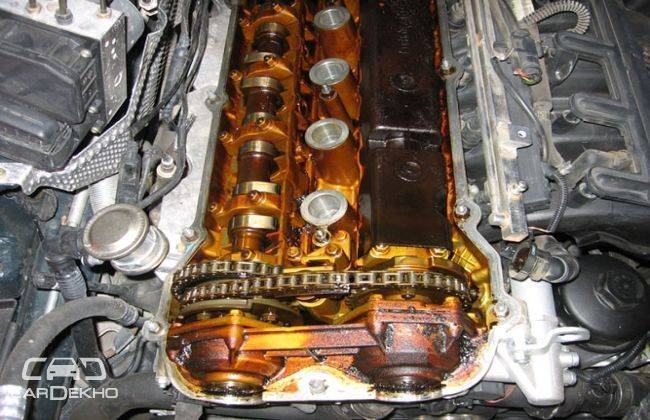Sludged: Remedies to keep your engine clean
Published On Jun 25, 2014 07:47 PM By CarDekho
- 1 Comments
- Write a comment
We all fear heart attacks and take several precautions, but when it comes to cars, we turn a blind eye. When we know that engine is the heart of the car, how many of us think what’s going on inside it is worthy enough to know? If it’s blood for the body, it’s oil for the engine. We all know engine oil is very necessary for the engine but how many of us know why? What does the oil do inside the engine, why is it important, what happens if we ignore to change the oil frequently and what is engine oil sludge?
Duties of the engine oil
Before understanding the concept of engine oil sludge, it is important to know what the oil does inside the engine. Easy, it lubricates. But it does not end there.

It lubricates: The main work of engine oil is to lubricate the components inside the engine. The engine oil allows all the components to work with each other with keeping the friction in check. The oil creates a barrier between the parts so that they continue to work continuously without getting over heated due to friction. The lubrication helps the engine to perform efficiently in terms of power and performance.
It cools: In keeping the friction in its lower levels, engine oil helps in dissipating the heat inside the engine. The cooler the engine, better the performance.
It cleans: Dirt is a normal byproduct in the combustion process and the deposits thus made in the engine will trap the heat inside. Engine oils are formulated to pick up the carbon deposits and other waste particles inside the engine and keep them in suspension, out of the way from the parts inside the engine.
It protects: The engine oil also helps protect your emissions systems by minimizing its own impact on these devices.

Overall, the engine oil separates and lubricates all the engine parts, provides protection in high temperatures, reduces friction, prevents deposits from clogging to the engine components, removes and suspends dirt and waste particles, cools engine parts, enhances fuel economy and protects the emissions system.
Engine oil sludge on
Now that you know what engine oil does, time for the sludge to come in. When oxidized oil and the contaminants (consisting of dirt, water and other waste materials) combine, the resulting unwanted byproduct is the engine oil sludge. Though the contaminants are supposed to be in held in suspension, they will try to get off the hold and settle into the components one way or another after sometime. While on one side, engines have been evolving at a steady pace to be more powerful, efficient, less polluting and longer lasting, the engine oils also on the other have evolved in their own way. Engine oils have been advancing on different levels - they can handle extreme temperatures, higher RPMs and much more - depending on the type of oil that you choose. Nowadays, oils also have additives added to them that assist them to perform different duties like maintaining their viscosity in extreme temperatures, better suspension properties to hold dirt particles and lasting longer before they needed to be changed.

But before all these advances, engine oils were more prone to these conditions. While engine oil sludge was in existence for quite some time, the issue came into light in the 90s. When the temperatures inside engine went north, the engine oils broke down faster. After this, people started using antifreeze but then forgot to change it, leading to cooling problems in the system. Antifreeze, after its prolonged life, will fail to perform its duty and in turn not only increases the engine temperature but also but the wornout antifreeze will turn to acid on the engine components.
Remember the engine oil’s duty to hold the dirt particles in suspension so that they won’t interfere with the engine’s functions? Well, if the oil is overworked beyond its ability and extended life, it loses this ability. No matter what type of oil is over used. Be it synthetic or conventional, all oils have equal chances of failing when over worked. The failure of engine oil leads it to lose the dirt particles form suspension and to deposit on to different components of the engine. Over time, the deposits keep adding more dirt particles to form dirty gel like soot inside the engine. This is sludge.
The formation of sludge prevents the heat to be retained inside the engine and when the engine is over heated, problems arise.
The problems
First, we know that oxidation, along with the dirt particles, result in sludge formation. In the case of sludge formation, the oxidation of the engine oil continues and keeps forming more sludge. This increases the level of oil inside the engine to do its duty efficiently. So, the oil fails to do its work leading to engine trouble.

Next, when the sludge starts forming, it expands its boundary reaching all the engine parts. It spreads to other components that it touches. This leads to the retention of heat inside the engine, putting more strain to the engine and its components. Radiator and cooling systems also get affected because of this. While being a coolant is also the engine oil’s part-time job, oil with sludge prevents that and does exactly the opposite - retains heat. And with every revolution, the oil sludge makes another step closer to damage your engine. The growth of oil sludge starts from the top of the engine. From the top, the sludge spreads through the valve covers and into the oil pan. This is followed by the blocking of oil screen siphon, leading to engine damage that includes poor mileage, loss of oil pressure and damage to gaskets, belt and other parts simultaneously. It also causes more wear than the components can take as the oil is not lubricating them enough.
Lessons to be learnt
Engine oils sludge formation is a result of various factors combined. These include irregular driving methods, extreme temperatures of engine, unbalanced oil temperatures and levels and oil contamination. When oil companies decided to fight sludge formation, they tried several methods. The engine oils were added with various performance additives to give them additional protection to work harder for a long time and to protect the engine.

Detergents oil additives: they help in keeping the engine clean and counteract the corrosive acids that form when the fuel is burned.
Dispersants: these remove soot and sludge and hold it in the oil to prevent blockages.
Anti-wear additives: these additives form a chemical layer between the moving parts of the engine and protect it. The anti-wear additives come in handy the engine is labored with high loads or during engine start-up.
Antioxidants: the antioxidants delay the natural degradation of engine oil and protect your the engine for longer of time and wear.
Friction modifiers: they reduce the drag between the components inside the engine and increase fuel economy.
Anti-rust additives: these are the additives that, obviously, prevent engine corrosion.
The additives also receive assistance from engine oil filters. Engine oil filters remove the suspended dust particles from the oil as they pass through and slow down the formation sludge deposits on the engine components.
The sludge formations are not only due to poor maintenance. They can also be as a result of inferior or unsuitable engine oils, contamination of coolants or weakening of oil additives. When detergent additives were introduced in engine oils, they were an instant hit. Everyone wanted to use the detergent additive enhanced oil and used them without knowing how to use or how much to use. While these types of oils attacked the sludge deposits initially, over use of oils with -detergent additives them flooding the engine bearings. This also resulted in a very high concentration of new particles in suspension in the oil along with the dust particles that were already present.
Topping up of engine oils repeatedly without proper maintenance and oil change will lead to serious trouble. If you are too lazy to change the engine oil of your car and keep topping it as the levels went down, then you will find yourself with a plate full of waste literally. Not changing the oil and other filters regularly will result in consumption of thick black waste in the oil pan that will block the drain hole.
The signs
While sludge deposits are harmful to the engine, early detection will save you a lot of money, time and the engine too. These are some tell-tale signs of sludge formation in the engine.

Chug-a-chug-chug: One of the symptoms of engine sludge can be detected right from starting the engine. A difficult start from a labored motor could be a sign of various problems in the engine. And sludge formation is one.
Misfire: During a journey or in the start-up itself, if you experience an ignition misfire, the problem could be the spark plug has failed to fire properly. The reason could be the spark plug being coated with oil because of worn out seals or components.
Engine too hot: Remember that the formation of sludge inside the engine prevents the heat from getting out of it? So if the engine temperature gauge flashes more often, it’s time for a visit to the service center.
Low oil: Same goes for the oil pressure indicator. When you put a certain amount of oil in the engine, the same amount constantly goes around the engine and is recycled. So, if the oil gets too thick to go around properly, it affects the performance of the engine in many ways.
Apart from these signs, uneven acceleration and bad mileage can also be indications of engine oil sludge.
Beat the sludge

Sludge formations are attributed to several factors and by changing your engine oil regularly according to your vehicle’s manual, you can prevent them. Proper maintenance or the lack thereof makes all the difference in the world.









![Why Choosing The Right Engine Oil Is Most Important For Your Car’s Health [Sponsored Feature] Why Choosing The Right Engine Oil Is Most Important For Your Car’s Health [Sponsored Feature]](https://stimg2.cardekho.com/images/carNewsimages/userimages/19541/Lubricant.jpg?tr=w-360?tr=w-89)



